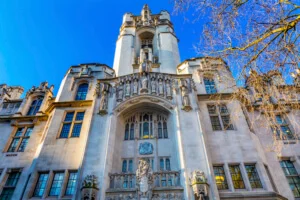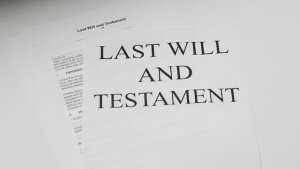Court Rejects Claim that Will was Forged: Case Study

Contact
Table of Contents
Court Rejects Claim of Forged Will
The court has rejected a claim that a will was forged, even though its origins could not be identified, it contained unusual clauses indicative of foreign law – and there were “suspicious” features.
Experienced Will Dispute Solicitors
The contested probate solicitors at Osbornes Law are experienced in advising and representing parties involved in will disputes, including those involving cross-border issues.
Case Study: Selvarajah v Selvarajah
Background of the Case
The testator, Selvarajah Sellathurai, made a will in August 2016 and died in September leaving behind his wife and four adult children. He was a wealthy businessman and philanthropist who originated from Sri Lanka and founded a Hindu temple in London.
His wife was the sole beneficiary and grant of probate was issued to the executors (two of the children). However, one of the daughters claimed the will was a forgery. She alleged that her siblings had caused the will to be drawn up and executed and that their late father’s signature was forged.
The judge’s task was particularly challenging: there was no evidence as to how the will was created; there was no will file with solicitors and no account or fee for it; and no instructions as to its execution. If it was homemade, there was no digital footprint available.
Unusual clauses
A further issue was the presence of certain clauses in the will which were unusual or unnecessary in the jurisdiction of England and Wales. The judge’s opinion was that the will was created from a precedent drafted by someone who was unfamiliar with English law.
However, this did not invalidate or undermine the will in and of itself – only if the will was defective would it be invalid.
No forgery
The will was valid and rational, notwithstanding the underlying unknowns surrounding its creation. The judge found on the facts that Mr Sellathurai had intended to make a will at some point (and not changed his mind).
The evidence given by the witnesses to the will – two old school friends of one of the defendants – was conclusive. Mr Sellathurai asked if they were free and could help him with the signing of his will; they saw him take up the will and sign it; and they then both signed it. Particular weight was given to the fact that the witnesses were independent professional women, separated both financially and geographically from the family.
Similarly, one of the defendants was a solicitor and would face severe professional consequences had she really been involved in forgery and lying on oath. It was hard to believe she would take such a risk.
Conversely, little or no weight was given to the claimant’s evidence, except where independently corroborated. The judge decided the claim was driven by the claimant’s suspicions and at times wild allegations without any evidence.
Key takeaway
Had the will been professionally drawn up, by solicitors within this jurisdiction, this dispute would have been far less likely to have reached the courts. The ruling is also a timely reminder to avoid going down the litigation route unless you have strong, conclusive evidence to support your case.
How Osbornes Law can help
For expert advice, if you have any concerns about the validity of a will, contact the specialist contested wills lawyers at Osbornes Law:
- Fill in our online enquiry form; or
- Call us on 020 7485 8811
Share this article
“Big enough to take on substantial cases and small enough to retain a personal touch’. It acts for a wide range of high-net-worth individuals, families, and trust companies in complex estate and trust litigation.”
“Jan Atkinson is a top-class contentious probate lawyer. Always on top of the detail and pleasant with opponents and peers alike, she is much sought-after for referrals work.”
Contact us today
Call us 020 7485 8811
Email us Send us an email and we’ll get back to you
Related InsightsVIEW ALL
- 4.6.2025
Supreme Court Confirms ‘No-Profit’ Rule For Fiduciaries
Trustees: Supreme Court confirms ‘no change’ to ‘no-profit’ rule for fiduciaries The contested probate and trusts team at Osbornes Law...
Read more - 15.5.2025
Family Conflicts Over Contested Wills
Inheritance disputes: when loved ones become opponents over an unclear will The contested wills and probate team at Osbornes Law...
Read more - 12.7.2024
Probate Mediation
Why choose mediation for contested probate? At Osbornes, we understand that probate litigation is often highly emotive. Unfortunately, there is...
Read more - 31.8.2023
Can a Lasting Power of Attorney Be Overridden?
Dramatic rise in people making a Power of Attorney The number of people recognising the importance of making a Lasting...
Read more - 26.7.2023
Wills Disputes: The Duty To Account Is Not...
Beneficiaries frequently ask us whether trustees or personal representatives can be required to provide a financial account. Their request may...
Read more - 9.6.2023
High profile probate dispute of Vladimir Scherbakov
Probate dispute of Russian billionaire’s missing will You’d imagine a wealthy businessman with assets in different countries would...
Read more - 9.6.2023
Of Bad Character: Undue Influence Claim Succeeds
Naidoo v Barton: undue influence and the risks of mutual wills Can someone’s bad character be used to prove...
Read more - 22.5.2023
Case Law: Dementia-Induced Mild Cognitive Impairment
Introduction Dementia is a harsh reality for increasing numbers of families. Sadly, it means the disputed wills solicitors at Osbornes...
Read more - 1.3.2023
How to prevent someone contesting a will
It is fairly rare in my experience for a parent to write a child out of their will but that...
Read more - 15.11.2022
Contentious Probate Case Studies
Contentious probate involving business assets Our contentious probate solicitors act for the defendants to a claim issued to pronounce in...
Read more - 27.10.2022
Contesting A Will Case Studies
Will dispute on grounds of lack of capacity Our contesting a will solicitors acted for the claimants, the adult daughters...
Read more - 25.10.2021
Inheritance Claims CFA Success Fee Judgment
The Court of Appeal upholds the recoverability of CFA success fees in 1975 Act claims. An individual who claims reasonable provision...
Read more - 20.10.2021
Evidence Needed When Contesting A Will
There must be a clear legal reason to contest a will on someone’s death, backed up by strong evidence....
Read more - 20.10.2021
Dispute Surrounding Interpretation of Will
The ‘nil rate band’ offers an incentive to testators to make their will in a tax-efficient manner, maximising the amount...
Read more - 20.10.2021
Handwriting Expert Witness Concludes Will Forgery
Successful contesting a will claim following testimony of handwriting expert It’s not unheard of for an individual to forge...
Read more - 20.10.2021
Understanding Testamentary Capacity
What is testamentary capacity? Testamentary capacity refers to a person’s legal and mental ability to create a valid will....
Read more - 20.10.2021
Unsuccessful Inheritance Act Claim
The case of Shearer v Shearer The recent reported case of Shearer v Shearer highlights that adult children cannot expect...
Read more - 13.8.2021
What is reasonable financial provision in 1975 Act claims?
Understanding “Reasonable Financial Provision” “Reasonable financial provision” under the Inheritance Act 1975, refers to the financial support that is reasonable for...
Read more - 9.10.2020
Undue Influence in Wills
What is Undue Influence in Wills? Undue influence occurs when someone pressurises another person to change their Will to gain...
Read more - 2.9.2020
Left Out of a Will: What Can I...
I was left out of my parent’s will. What can I do? Understanding Your Situation Whilst testators in England...
Read more























